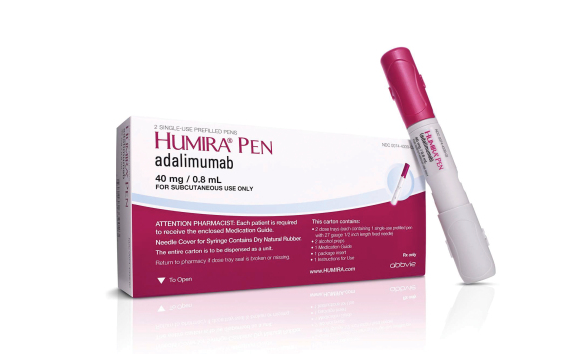The U.S. patent for Humira (ingredient: adalimumab), a representative blockbuster drug of AbbVie and the world's top-selling drug, will expire next year.

As most of Humira's sales come from the U.S., industry watchers expect that competition in the U.S. adalimumab market will intensify as numerous pharmaceutical companies are planning to jump into the market with Humira biosimilars.
Humira inhibits the cytokine tumor necrosis factor (TNF). The U.S. Food and Drug Administration (FDA) first approved Humira to treat rheumatoid arthritis in December 2002. Since then, Humira has sequentially secured indications for nine autoimmune diseases.
Notably, Humira is a mega-blockbuster drug that has held the top sales spot among pharmaceuticals for nine consecutive years since 2012.
However, AbbVie’s revenue from Humira in Europe has been recently declining with the advent of rival biosimilars.
In the third quarter, Humira's global sales excluding the U.S. amounted to $603 million, down 25.9 percent from $812 million in the same period last year.
However, AbbVie managed to increase its third-quarter sales compared to the previous year, thanks to the strong support of the U.S. market.
Approximately 80 percent of Humira's revenue in the third quarter came from the U.S., where it recorded sales of $4.956 billion, up 7.4 percent from the same period last year ($4.613 billion).
Thanks to robust sales in the U.S., Humira raised $5.559 billion in sales in the third quarter, up 2.4 percent from the same period last year ($5.425 billion), despite the fierce global competition.
However, with Humira's patent ending next year, AbbVie is set to face fierce competition in its biggest market for the drug.
While Humira's U.S. patent expiration period was initially slated for December 2016, it was delayed by eight years as global biopharmaceutical companies made a deal with AbbVie to release Humira biosimilars after 2023.
Almost 10 biosimilar products are scheduled to be released sequentially next year.
Among them, Amgen's Amjevita will be the first Humira biosimilar to launch in the U.S. in 2023. Amjevita was the first to receive FDA approval as a Humira biosimilar in September 2016, three months before Humira's U.S. patent expired.
Other biosimilars set for launch next year include Organon' Hadlima, Boehringer Ingelheim's Cyltezo, Novartis' Hyrimoz, Pfizer's Abrilada, Viatris's Hulio, Coherus Bioscience's Yusimry, and Fresenius Kabi's Idacio.
As global pharmaceutical companies are expected to compete fiercely, industry watchers are paying close attention to what differentiated strategies companies will implement.
Industry experts agree that the most important factor in Humira biosimilar competition is price reduction.
Fierce competition outside of the U.S. has led to price cuts of adalimumab-based treatments.
According to market watchers, in Europe, where Humira biosimilars have already been released, the price for adalimumab-based treatments has declined by about 80 percent.
Another representative differentiation strategy is formulation modification.
Various companies have followed AbbVie's strategy in launching a citrate-free adalimumab product. While Humira's initial version used citrate, AbbVie had previously launched a citrate-free version because although citrate plays a role in stabilizing the protein by maintaining the acidity of the active ingredient, it causes injection site reactions (ISR) when used.
Also, also some companies increased the concentration from low at 50 mg/mL to high at 100 mg/mL to reduce the volume of administration and changed the thickness of the injection needle was altered from 27 gauge to 29 gauge to differentiate the formulation.
Notably, Samsung Bioepis is the only company that has acquired FDA approval for a high-concentration Humira biosimilar so far.
Celltrion and Alvotech, a subsidiary of Alvogen, are also in the process of obtaining approval for high-concentration formulations.
While AbbVie is expected to see a drop in sales in the adalimumab market, the company has already set up contingencies to maintain its dominance in the autoimmune disease market.
AbbVie has already launched the interleukin inhibitor Skyrizi (ingredient: risankizumab) and the JAK inhibitor Rinvoq (ingredient: upadacitinib) in the field of autoimmune diseases.
AbbVie has been using the two drugs to slowly replace Humira by gradually securing indications in the field of inflammatory diseases after their release.
The FDA first approved Skyrizi in April 2019 to treat moderate to severe plaque psoriasis.
AbbVie expanded the indication for Skyrizi in treating active psoriatic arthritis in adults in January, and moderate to severe active Crohn's disease in adults in June of this year.
Rinvoq, which obtained approval in August 2019, has indications for rheumatoid arthritis, psoriatic arthritis, atopic dermatitis, and adult ulcerative colitis.
In April, it also received FDA approval for the treatment of active ankylosing spondylitis.
Both drugs are growing fast in the market. As of 2021, Rinvoq and Skyrizi's worldwide sales were $1.651 billion and $2.939 billion.
While their combined sales only amounted to about one-fifth of Humira's 2021 sales, AbbVie expects the two drugs will replace Humira.
During the 2022 J.P. Morgan Healthcare Conference, AbbVie said it expects the sales of the two drugs to reach $15 billion in 2025.

